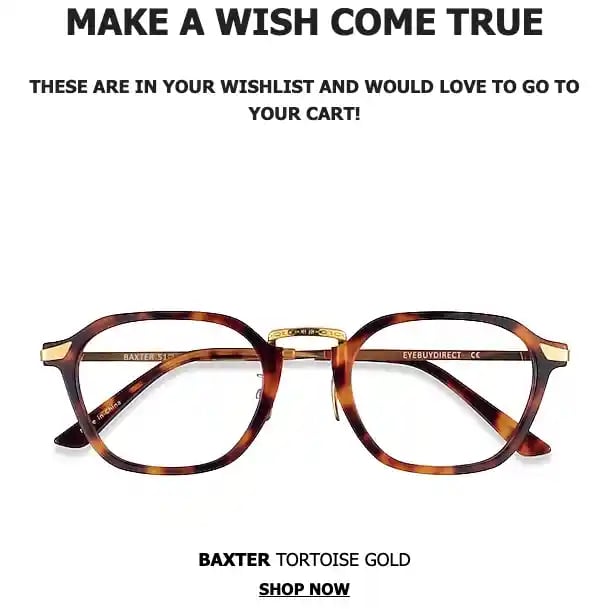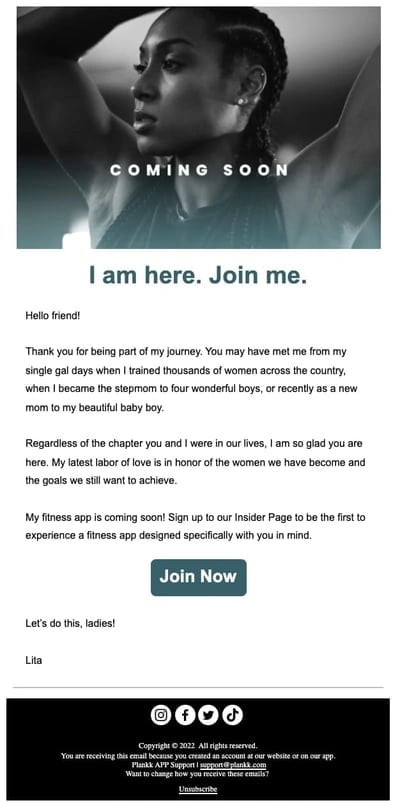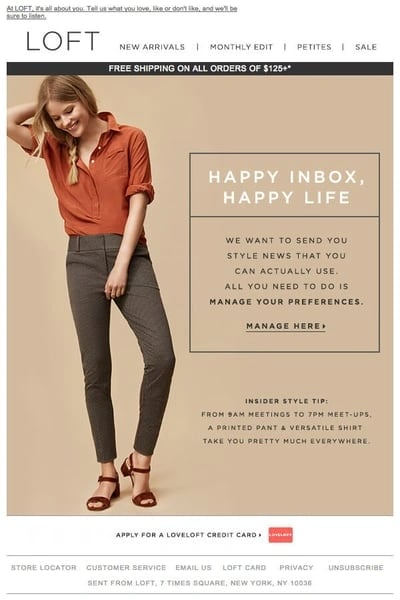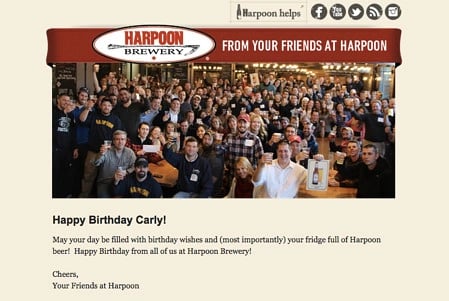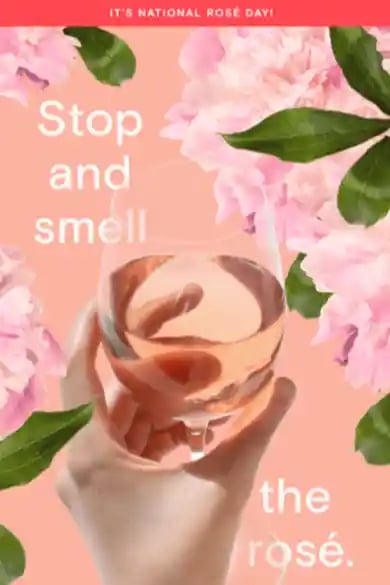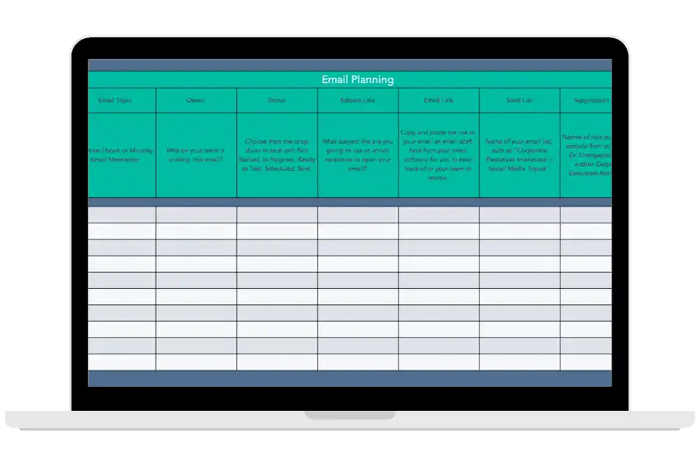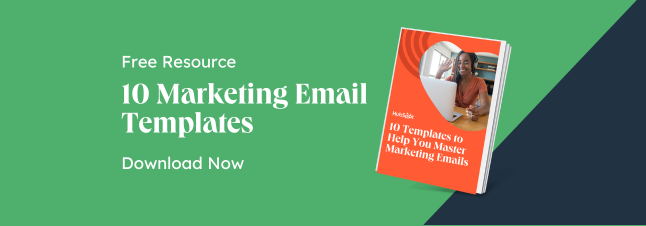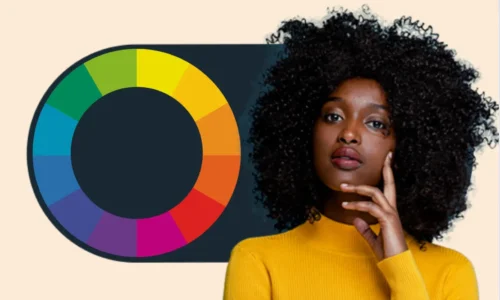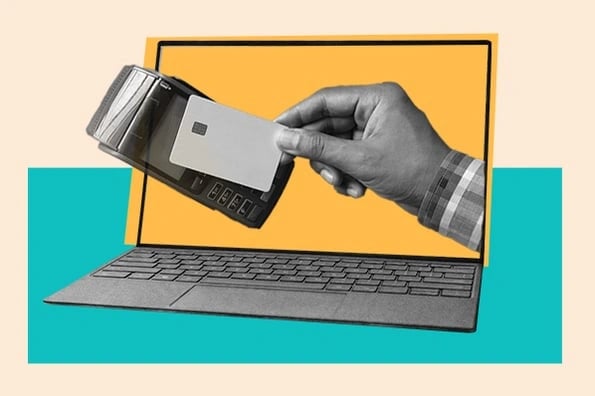
30 Brilliant Marketing Email Campaign Examples [+ Template]
- August 1, 2023
- Knowledge Base
- 0 Comments

On any given day, most of our email inboxes are flooded with a barrage of automated email newsletters that do little else besides giving us another task to do on our commutes to work — namely, marking them all as unread without reading or unsubscribing altogether.

 It may not seem like a good idea to add to all the noise. However, according to Constant Contact, the average ROI for email marketing is $42 for every $1 spent.
It may not seem like a good idea to add to all the noise. However, according to Constant Contact, the average ROI for email marketing is $42 for every $1 spent.
Needless to say, email is an important component of a marketing strategy, and its success relies largely on how well you craft your email campaigns.
In this post, we’ll explore:
Let’s get started.
What is an email marketing campaign?
An email marketing campaign is a scheduled series of emails used to nurture leads and current customers with the purpose of encouraging engagement and increasing sales. Each individual email leads to a specific call-to-action, i.e. getting users to sign up, book a call, continue reading, or add a product to their cart.
Email campaigns are an important part of inbound marketing, an ongoing process and philosophy coined by HubSpot where marketers meet buyers in whatever stage of the journey they’re in.
Inbound marketing acknowledges that not everyone is ready to buy from you at this exact moment. That’s why email is such an important channel.
Through email, you’re able to stay top-of-mind by providing communication to their personal inbox, and you can do it at scale with marketing automation software.
It’s important that an email campaign’s recipients have opted in to receive this content and that each piece offers something valuable.
Effective Email Marketing Campaigns
An email marketing campaign is as effective as its ultimate goal. Here are some examples of different purposes your email campaign may set out to accomplish:
1. Traffic Generation Email Marketing Campaigns
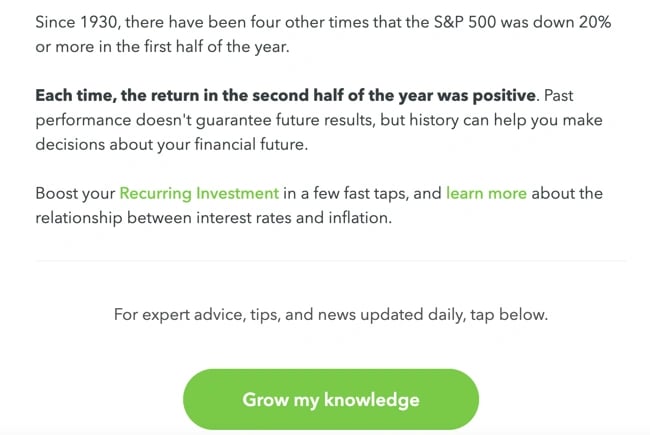
One of the biggest benefits of email marketing? Getting click-throughs to pages on your website.
In fact, 45.2% of marketers listed generating web traffic as one of the primary objectives of their email marketing campaign, according to our most recent email marketing survey.
Not only does email marketing boost your referral traffic, it also drives visitors who’ve already shown an interest in your business, making it more likely that they’ll act once they get to your site.
Overall, email is an effective promotion channel for the high-value content you create on your website. It can help you drive qualified traffic to your product pages, blog posts, and web pages, consequently boosting conversions.
2. Awareness Email Marketing Campaigns
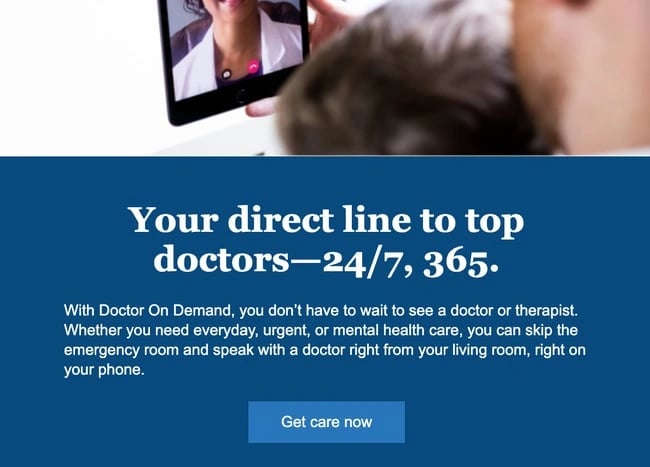
Not everyone who opts into your email list is ready to make a purchasing decision. You can use email marketing to stay top of mind while providing the educational content that is most relevant to them.
Indeed, brand awareness email campaigns help you solve for your readers and also establish yourself as a leader in your industry.
43.9% of marketers in our survey listed increasing brand awareness as one of the primary objectives of their email strategy.
If subscribers hear more from you than they do from your competitors, they’re more likely to rely on you when they need more information on a topic — or when they need a certain product.
3. Lead Nurturing Email Marketing Campaigns
As you stay top of mind, you may also consider ways to identify the leads with the highest purchase intent and provide conversion-focused content that “nurtures” them toward a sale (or at least toward becoming sales-ready).
In these emails, you can be more up-front about wanting recipients to buy. You can include shopping-centric calls-to-action, such as “Shop now,” “Buy now,” and “Add to cart.”
However, it’s essential for recipients to have shown strong purchase intent. Adding items to their cart or having a purchase history are both strong indicators.
(Tip: You can find out behavioral and purchasing data using your ecommerce tool, CRM, or CMS.)
If you target these emails to casual visitors or first-time subscribers, you may be rushing them and inadvertently discouraging them from buying from you.
4. Revenue Generation Email Marketing Campaigns
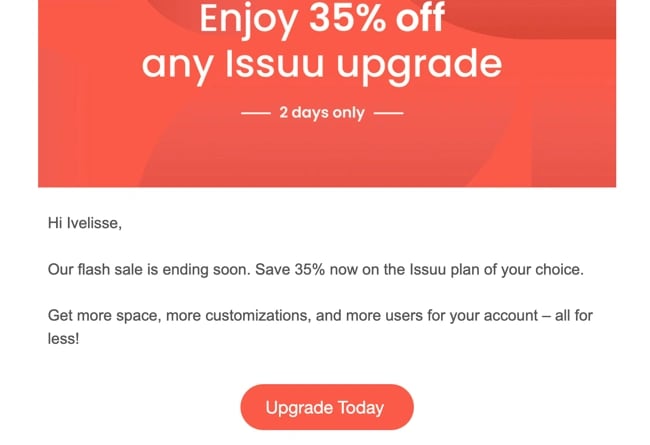
You can create email marketing campaigns for your existing customers to promote upsell and cross-sell opportunities. You can also create campaigns to capture a sales conversion from leads who are close to a purchasing decision.
One example might be creating “abandon cart” campaigns for recovering lost sales conversions; or, like in the example above, promoting a flash sale to get users to upgrade.
These types of campaigns are best reserved for subscribers at the bottom of the conversion funnel. In other words, they have shown unquestionable purchase intent by either visiting a checkout page or booking a call with your sales team.
57.8% of marketers listed increasing revenue as one of the main objectives of their email marketing strategy, according to our survey.
.webp?width=543&height=362&name=Copy%20of%20Linkedin%20-%201104x736%20-%20Horizontal%20Bar%20Graph%20-%20Light%20(3).webp) Effective email marketing campaigns need to be cleverly written to attract attention in busy inboxes, but the options are endless. Check out these 10 email marketing tips in 60 seconds:
Effective email marketing campaigns need to be cleverly written to attract attention in busy inboxes, but the options are endless. Check out these 10 email marketing tips in 60 seconds:
Now that you know the most effective campaigns you can create, grab some inspiration from the masterful email marketing campaigns below.
Best Email Marketing Campaign Examples
If you’re reading this, you probably have an email address (or two, or three …). In fact, you’ve probably been sending and receiving emails for years, and you’ve definitely received some questionable deliveries in your inbox.
Whether they were unexpected, uninformative, or had a subject line tHaT wAs fOrmAtTeD liKe tHiS, we bet you didn’t hesitate to direct them towards the trash, right?
While email has managed to stand the test of time, many marketers have failed to update their strategies since its inception.
So to ensure you’re sending modern emails that warrant some of your recipients’ precious time and attention, we’ve compiled a list of effective email examples to inspire your next campaign.
If you still need assistance, HubSpot’s campaign assistant can help write email marketing campaign materials. Furthermore, HubSpot’s email marketing tools are available to help you craft and execute a winning email marketing strategy.
1. AutoTrader
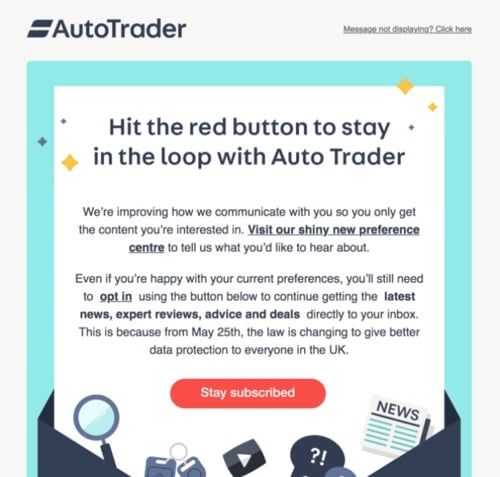
Marketing Campaign: Email Preferences
Great companies are always evolving, and your customers expect to experience change. What they don’t expect (because too many companies haven’t lived up to this end of the bargain) is to be told about those changes.
That said, this email from AutoTrader serves as a refreshing change of pace.
If you’re going to change the way you communicate with a lead or customer, give them clear, fair warning so, if they aren’t on board, they can make the necessary adjustments to keep their inbox clean.
Why It Works
It sets expectations for communication moving forward so that the buyer persona can choose what’s best for them. We also love the clear headline, clean design, and eye-catching call-to-action (“Stay subscribed”).
2. Netflix
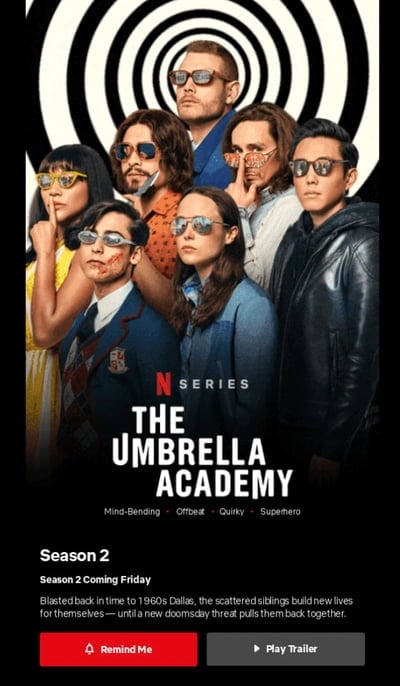
Marketing Campaign: Engagement
More than half of US households subscribe to multiple streaming channels. With several platforms vying for our attention, brands like Netflix have gotten more targeted with its emails.
This email from Netflix provides a curated list of new shows the customer may be interested in based on their watch history.
It’s skimmable with plenty of visuals supporting the new releases and provides a CTA that prompts you to watch the trailer.
It aso uses Netflix’s familiar black-and-red design, so that the recipient feels like they’re scrolling through Netflix, demonstrating the importance of keeping branding consistent across all your messaging channels.
Why It Works
The CTAs in this email entice the user to stop what they’re doing and head over to Netflix to check out the new content. It also includes a “Top Picks for You” section that shows personalized recommendations for the user.
3. Lita Lewis Fitness
Marketing Campaign: Update
Have a new product or project in the works? It’s a good idea to let your subscribers know prior to the launch, especially if you’ve been away for a while.
Fitness expert and trainer Lita Lewis did just that in this email, where she reconnects with her subscribers and informs them about her upcoming app.
Why It Works
This email is personable and reads like you’re catching up with an old friend. Additionally, the “Join Now” CTA makes it easy for readers to sign up for the app and other updates.
30.7% of marketers say emails announcing new products or features have the highest click-through rates.
.webp?width=536&height=281&name=Copy%20of%20Facebook%20Shared%20Link%20-%201200x628%20-%20Percentage%20+%20Copy%20-%20Light%20(4).webp) 4. Starbucks
4. Starbucks
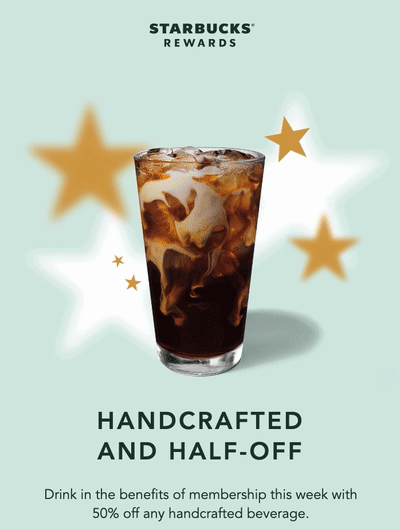
Marketing Campaign: Promotion
Did you see that? Did you see it move? Pretty cool, right? This small bit of animation helps to separate this email from Starbucks from all of the immobile emails in its recipients’ inboxes.
It also leverages exclusivity by framing the promotion as a benefit of having a Starbucks membership. Oftentimes, this type of positioning makes the recipient feel like they’re specially chosen, which encourages them to take advantage of the special opportunity they’ve been presented with.
At the bottom, the terms read, “This offer is exclusive to you and this Starbucks Rewards account and cannot be reproduced, transferred or used by anyone else.” What feels more exclusive than that? We love it.
Why It Works
Emails can get static, boring, and impersonal. This email subverts those expectations without going overboard. Its focus on exclusivity makes it a specially excellent addition to any inbox.
Similar to new product announcement emails, 30.7% of marketers say emails containing special offers and promotions have the highest click-through rate.
5. Venmo
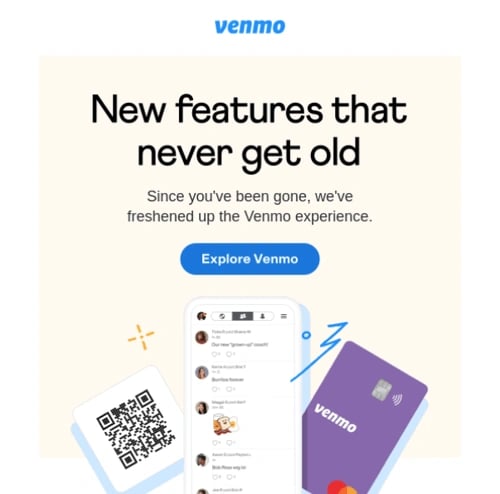
Marketing Campaign: Re-Engagement Campaign
Venmo makes an effort to reengage lost users with this friendly, informational email. By highlighting their app’s most recent changes and benefits, the copy works to entice recipients to give the app another chance.
It also discusses benefits that the recipient may not know about since the last time they used the service.
The email is brief, but packs enough information for the recipient to make an informed decision.
Why It Works
Small inclusions like the “Explore Venmo” CTA and the benefit-focused copy makes the content feel welcoming and less aggressive. We also love the branded imagery and engaging graphics.
6. Litmus
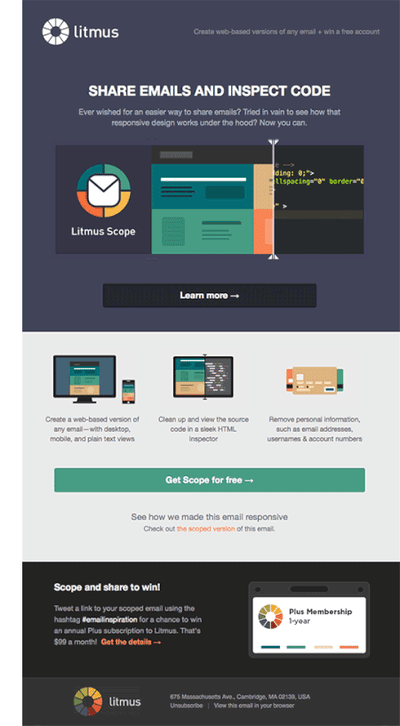
Marketing Campaign: Promotion
Here’s another great example of animation being used to create a more interesting email marketing design.
Unlike static text, the swipe motion used to provide recipients with a look “under the hood” of their email tool is eye-catching and encourages you to take a deeper dive into the rest of the content.
Not to mention the header does an excellent job of explicitly stating what this email is about.
Why It Works
The animation is subtle, and it’s executed in a way that serves to enhance the email’s body copy. Even better, it works well with the design of the email, creating a matching but contrasting focal point before the reader dives into the rest of the copy below.
7. Loft
Marketing Campaign: Email Preferences
This email from Loft aims to demonstrate their understanding of your crazy, mixed-value inbox.
In an effort to provide you with emails that you actually want to open, Loft asks that their recipients update their preferences to help them deliver a more personalized experience.
This customer-focused email is super effective in making the recipient feel like their likes, dislikes, and opinions actually matter.
Why It Works
It centers the recipient’s needs with the slogan “Happy Inbox, Happy Life.” Paired with a low-friction CTA, the copy is simple and effective.
8. UncommonGoods
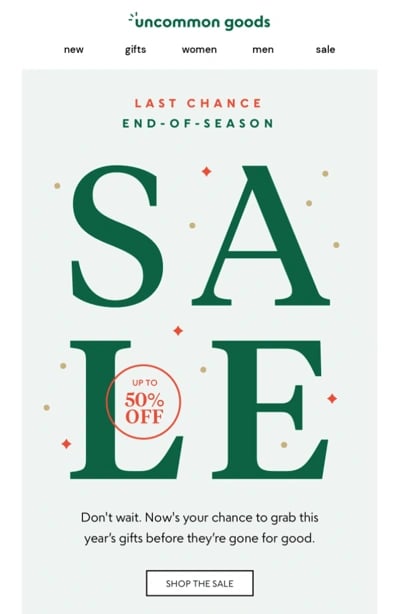
Marketing Campaign: Promotion
You’ve heard it a million times (and a few thousand of those times may have been from us): You should create a sense of urgency with your calls-to-action. That’s what makes a lead take action, right?
Well, this email from UncommonGoods succeeds in creating a sense of urgency by focusing on the value of acting now.
Why It Works
Instead of saying, “Order your holiday gifts NOW!”, this email says, “Now’s your chance to grab this year’s gifts before they’re gone for good.” Why, don’t mind if I do.
Thank you for reminding me before it’s too late — I don’t want to be in the dog house because my gift arrived after the holidays.
9. DAVIDsTEA
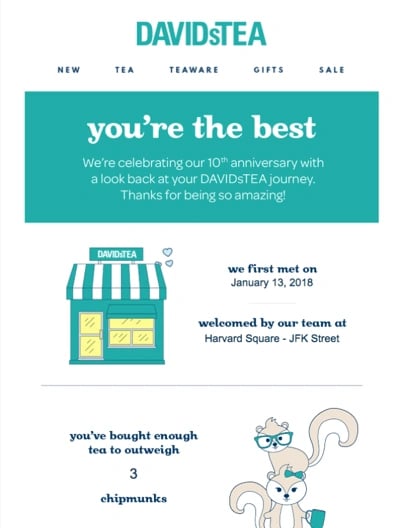
Marketing Campaign: Customer Delight
Confession: We have a serious email marketing crush on DAVIDsTEA. And they continue to deliver their lovable marketing in this cheeky email campaign that aims to humorously reengage customers.
Every element from the header, to the image of the chipmunks, to the friendly copy work together to create a campaign that’s promotional without being pushy.
It’s also highly personalized, containing information about the recipient’s first day as a customer, most frequent tea purchases, and personalized tea profile (spoiler: this recipient would be a super zen herbal tea).
This email is just as delightful as drinking the real thing.
Why It Works
This copy is bursting with friendly personality and tea jokes. The email is relatable and reads as though it comes from a friend, which helps earn a positive reaction.
10. Harpoon Brewery
Marketing Campaign: Customer Delight
My friends at Harpoon are so thoughtful, aren’t they? This simple, timely email really does feel like it’s coming from a friend, which is why it’s so effective. In an age of email automation, it’s easy for email campaigns to feel a little robotic.
And while I’m certain that this email was, in fact, automated, it feels really human.
If you’re looking to strengthen the relationship you have with your existing customers, consider taking the time to set up a quick email like this to let them know you’re thinking of them.
Why It Works
Personalization: From the timing of the email (birthday) to the personalized salutation, this email was sent to the right person at the right time. I also love the image of the team, making this email feel even more personable.
11. Buoy
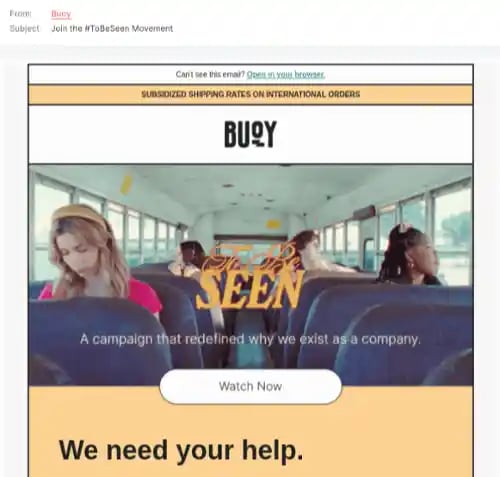
Marketing Campaign: Promotion
“We need your help.”
That’s quite powerful, wouldn’t you agree? Buoy, a company that creates water infusion products, combines urgency and our psychological need to be part of something to create an email headline that jumps off the page.
This positioning is designed to lead people to act on their altruistic values, align their philanthropic goals with the company’s mission, and take action in a way that benefits them, the company, and the community the company aims to serve.
Why It Works
At the end of the day, people want to be part of something that’s bigger than themselves, and this email aims to motivate them to do so by watching a documentary and taking further action.
12. J.Crew Factory
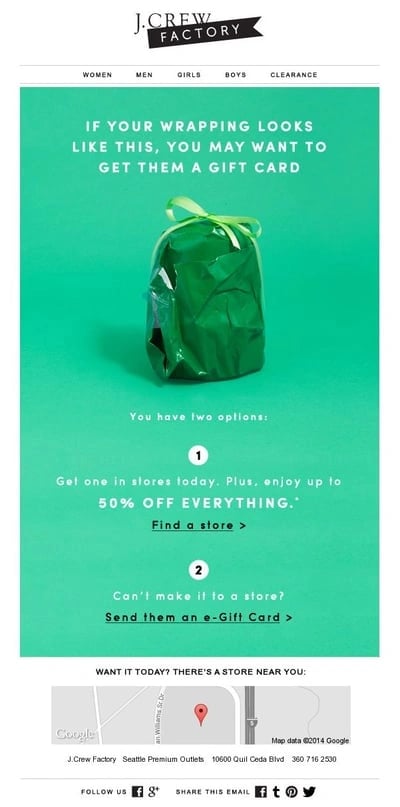
Marketing Campaign: Promotion
For many of us, when it comes to wrapping gifts, the struggle is real. J.Crew Factory recognized this problem and then created this email to serve as a solution for those incapable of pulling off a Pinterest-esque wrap job: gift cards.
The email offers up two different ways to pick up a gift card — in store or online — in an effort to avoid excluding anyone.
They’ve also included a map of the nearest store location at the end of the email to lower the purchasing barrier even further.
Why It Works
It combines humor with a low-stress, low-friction solution. We also love the image of a shoddily-wrapped gift, signaling how much easier it is to buy a gift card — no wrapping required.
Plus, the green color of the background emphasizes that gift cards are a more environmentally friendly option.
13. charity: water

Marketing Campaign: Engagement
When people talk about email marketing, lots of them forget to mention transactional emails. These are the automated emails you get in your inbox after taking a certain action on a website.
This could be anything from filling out a form to purchasing a product to updating you on the progress of your order. Often, these are plain text emails that marketers set and forget.
Well, charity: water took an alternate route. Once someone donates to a charity: water project, her money takes a long journey.
Most charities don’t tell you about that journey at all, but charity: water uses automated emails to show donors how their money is making an impact over time.
With the project timeline and accompanying table, you don’t even really need to read the email — you know immediately where you are in the whole process so you can move onto other things in your inbox.
Why It Works
It keeps the audience engaged and shows the impact that their actions have made on the organization in the effort of staying top-of-mind and increasing future participation.
14. Uber
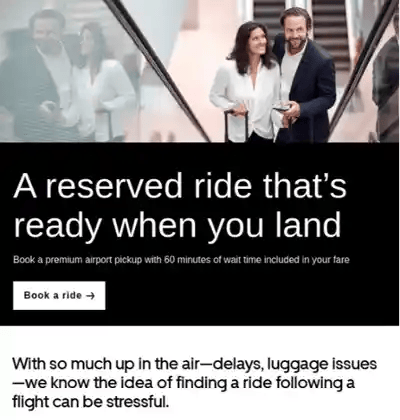
Marketing Campaign: Engagement
The beauty of Uber’s emails is in their simplicity. Email subscribers are alerted to deals and promotions with emails like this one. We love how brief the initial description is, paired with a very clear CTA — perfect for subscribers who are quickly skimming the email.
For the people who want to learn more, the header is followed by a more detailed (but still pleasingly simple) list of benefits about booking an airport ride in advance.
We also love how consistent the design of Uber’s emails is with its brand. Like its app, website, social media photos, and other parts of the visual branding, the emails are represented by its black-and-white palette and custom font.
Why It Works
All communications and marketing assets tell a brand’s story — and brand consistency is one tactic Uber has nailed in order to gain brand loyalty. This email demonstrates the usual Uber colors and imagery, while making the value proposition clear.
15. TheSkimm
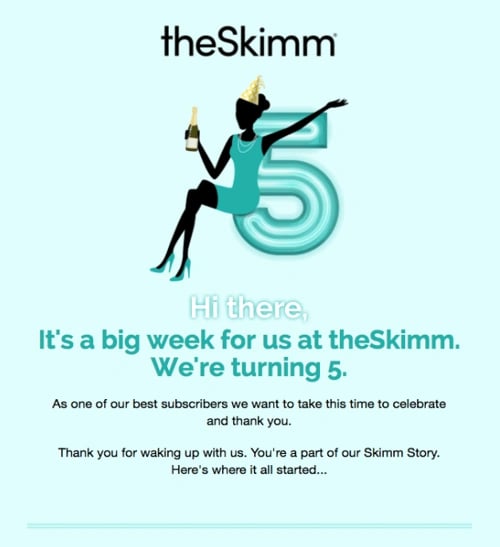
Marketing Campaign: Customer Delight
We love TheSkimm’s daily newsletter — especially its clean design and its short, punchy paragraphs. But newsletters aren’t TheSkimm’s only strength when it comes to email.
This subscriber engagement email rewards one of its subscribers for being subscribed for several years.
It includes the date the recipient signed up, the number of mornings spent together, and even the number of minutes the user has spent reading the newsletter. Talk about a high level of personalization!
Emails triggered by milestones, like anniversaries and birthdays, are fun to get — who doesn’t like to celebrate a special occasion?
The beauty of anniversary emails, in particular, is that they don’t require subscribers to input any extra data, and they can work for a variety of senders. Plus, the timeframe can be modified based on the business model.
Why It Works
The folks at TheSkimm took it a step further by presenting an offer to the recipient: They can have the chance to earn $1,000 if they refer other people to TheSkimm. The call-to-action has arrows pointing to it so that there’s no chance of missing it.
16. Mom and Dad Money
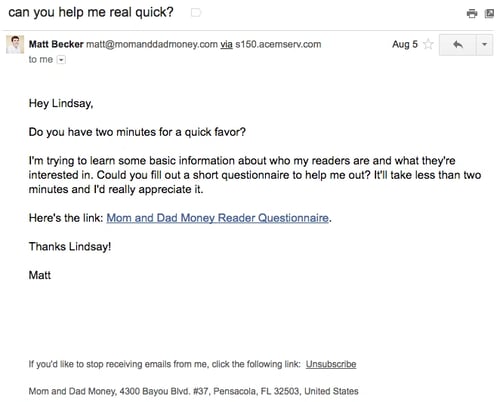
Marketing Campaign: Questionnaire
Think you know all about the people who are reading your marketing emails? How much of what you “know” about them is based on assumptions?
The strongest buyer personas are based on insights you gather from your actual readership, through surveys, interviews, and so on — in addition to market research.
That’s exactly what Matt Becker of Mom and Dad Money does — and he does it very, very well.
Here’s an example of an email I once received from this brand. Design-wise, it’s nothing special — but that’s the point. It reads just like an email from a friend or colleague asking for a quick favor.
Why It Works
Not only was this initial email great, but his response to my answers was even better.
Within a few days of responding to the questionnaire, I received a long and detailed personal email from Matt thanking me for filling out the questionnaire and offering a ton of helpful advice and links to resources specifically catered to my answers.
I was very impressed by his business acumen, communication skills, and obvious dedication to his readers.
17. Birchbox
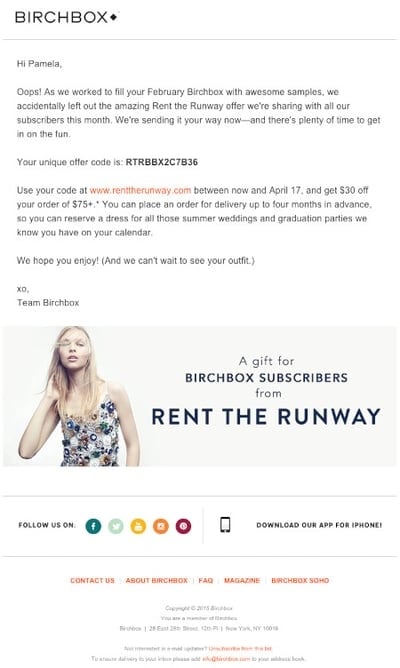
Marketing Campaign: Promotion
The subject line of this email from beauty product subscription service Birchbox got my colleague Pam Vaughan clicking.
It read: “We Forgot Something in Your February Box!” Of course, if you read the email copy below, Birchbox didn’t actually forget to put that discount code in her box — but it was certainly a clever way to get her attention.
As it turned out, the discount code was actually a bonus promo for Rent the Runway, a dress rental company that likely fits the interest profile of most Birchbox customers — which certainly didn’t disappoint.
That’s a great co-marketing partnership right there.
Why It Works
It gained her attention and delivered some unexpected delight. We also love how frills-free it is — the message is mostly text, making it feel like an email one would receive from a friend.
18. Postmates
.gif?width=400&height=185&name=chipotle-gif%20(1).gif)
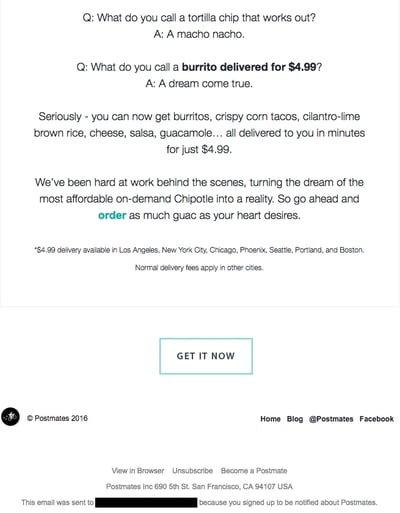
Marketing Campaign: Promotion
I have to say, I’m a sucker for GIFs. They’re easy to consume, they catch your eye, and they have an emotional impact — like the fun GIF in one of Postmates’ emails that’s not only delightful to watch, but also makes you crave some delicious Chipotle.
You, too, can use animated GIFs in your marketing to show a fun header, draw people’s eyes to a certain part of the email, or display your products and services in action.
Why It Works
It centers the product in a fun, attractive way. Not only that, but it effectively catches the eye of the recipient, differentiating the message from others in their inbox.
19. Dropbox
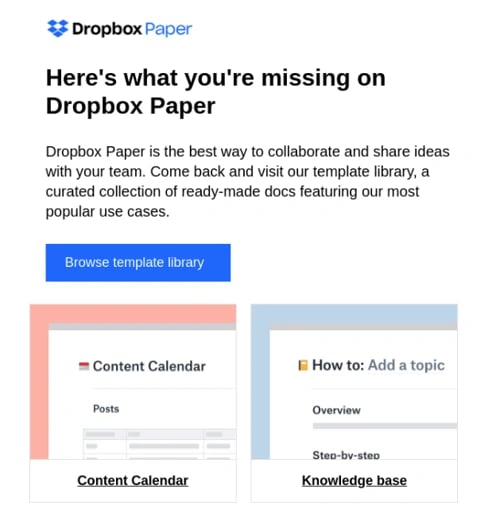
Marketing Campaign: Re-Engagement
You might think it’d be hard to love an email from a company whose product you haven’t been using.
But Dropbox found a way to make its “Try out one of our products!” email professional, polite, and actionable, thanks to an impossible-to-miss call-to-action and immediate links to template libraries.
Plus, the email remains short and sweet, to emphasize the message that Dropox didn’t want to intrude — it just wants to remind the recipient that Dropbox Paper exists, and why it could be helpful.
When sending these types of emails, you might include an incentive for recipients to try out one of your specific products, like a limited-time coupon or a free trial.
Why It Works
It uses a grid layout that’s simple and user-friendly to demonstrate their product as a diverse solution.
In this email, the recipient gets a glimpse of what they’re missing by not using Dropbox Paper — templates and documents they could begin customizing immediately.
20. Inside Design by InVision
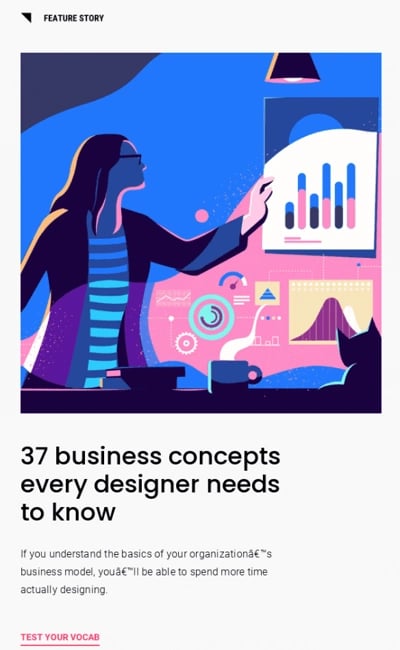
Marketing Campaign: Newsletter
Every week, the folks at InVision send a roundup of their best blog content, their favorite design links from the week, and a new opportunity to win a free t-shirt. (Seriously. They give away a new design every week.)
They also sometimes have fun survey questions where they crowdsource for their blog. For example, one week, they asked subscribers what they would do if the internet didn’t exist.
Why It Works
Not only is InVision’s newsletter a great mix of content, but I also love the nice balance between images and text, making it really easy to read and mobile-friendly.
It’s especially important, because its newsletters are so long. We like the clever copy on the call-to-action buttons, too.
21. Mob Kitchen
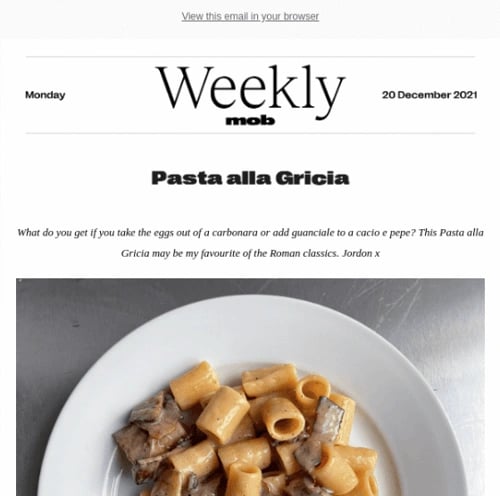
Marketing Campaign: Newsletter
I’ve been a huge fan of Mob Kitchen’s “Weekly Mob” newsletter for a while. The company sends a yummy recipe to my inbox every week. But I didn’t just include it because of its delicious recipes — I’m truly a fan of its emails.
I especially love the layout of Mob Kitchen’s emails. Each message features three distinct sections: one for the ingredients, one for the instructions, and one for additional recipes.
That means you don’t have to go hunting to find the most interesting part of its blog posts — you know exactly where to look after an email or two.
In addition, it contains an attractive image of the recipe and a quote from one of Mob Kitchen’s staff members. I also love the “Tell Us What You Think” CTA at the bottom of the email.
Why It Works
The eye-catching imagery and user-friendly design make Mob Kitchen’s newsletter a winner, but we especially love the prompt to provide feedback about the content itself.
Sometimes, the most valuable source of information isn’t an A/B test, but your own pool of subscribers.
22. Cuisinart
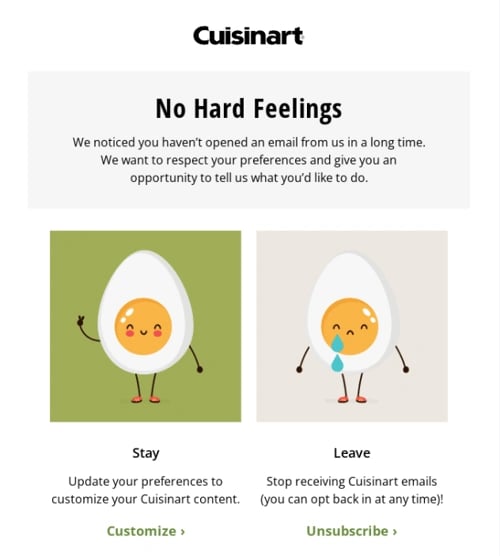
Marketing Campaign: Email Preferences
“Pssst…we have a question for you.” That was the subject line of this automated unsubscribe email from Cuisinart. We love the simple, guilt-free messaging here, from the endearing egg images to the great CTA button copy.
Not only is the design and copy here top-notch, but we applaud the folks at Cuisinart for sending automated unsubscribe emails in the first place.
It’s smart to purge your subscriber lists of folks who aren’t opening your email lists, because low open rates can seriously hurt email deliverability.
Why It Works
The button copy is a pattern interrupt that will prompt the recipient to pause and think about which action they want to take: Customize their preferences or completely unsubscribe.
Giving your subscribers this choice creates a delightful experience for those who’d like to opt in and those who’d like to opt out.
23. Paperless Post
Marketing Campaign: Promotion
When you think of “holiday email marketing,” your mind might jump straight to Christmas, but there are other holidays sprinkled throughout the rest of the year that you can create campaigns around.
Download these email marketing planning templates to keep yourself organized throughout the year.
Take this email from Paperless Post, for example. I love the header: “Stop and smell the rosé” (in honor of National Rosé Day). Then, the subheader prompts the recipient to use Paperless Post to invite friends and colleagues for a drink.
Below this copy, the simple grid design is both easy to scan and quite visually appealing. Each button is a CTA in and of itself — click on any one of them, and you’ll be taken to a purchase page.
Why It Works
It earns a positive sentiment by prompting the recipient to do something they may have forgotten: Inviting colleagues out to enjoy a drink on a holiday that’s not too often celebrated.
This provides a solution and allows the recipient to build camaraderie with their coworkers.
24. Luminary
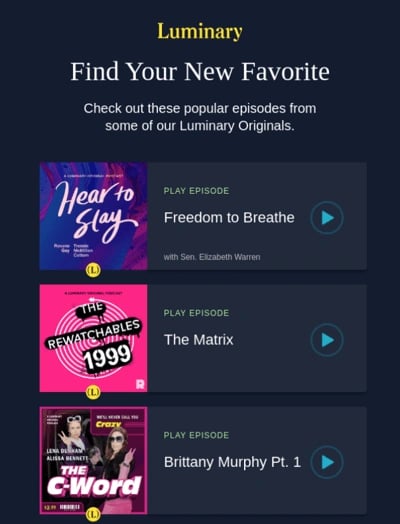
Marketing Campaign: Engagement
I love on-demand podcast app Luminary’s “Find Your New Favorite” emails. I tend to listen to episodes from the same podcast instead of branching out to new ones.
But Luminary wants me to discover (and subscribe to) all the other awesome content it has — and I probably wouldn’t without this encouragement.
I think this email also makes quite a brilliant use of responsive design. The colors are bright, and it’s not too hard to scroll and click — notice how each podcast row is large enough for me to hit with my thumbs.
Also, the mobile email has features that make sense for recipients who are on their mobile device. Check out the CTA at the bottom of the email, for example: The “Browse Originals” button prompts the app to open on your phone.
Why It Works
As humans, we tend to crave personalized experiences. So when emails appear to be created especially for you, you feel special — you’re not just getting what everyone else is getting.
You might even feel like the company sending you the email knows you in some way, and that it cares about your preferences and making you happy.
25. RCN
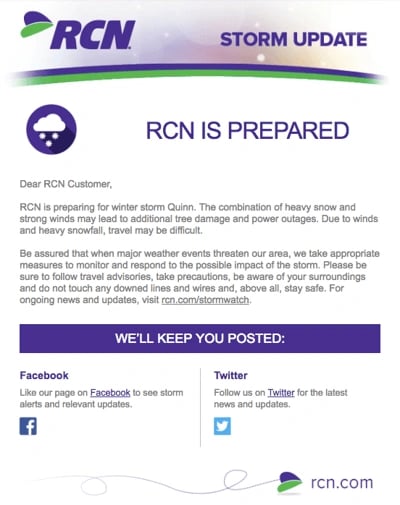
Marketing Campaign: Update
Internet providers and bad weather are natural enemies. You’d think telecommunications companies wouldn’t want to call attention to storm-induced power outages — the one thing that sets off customers’ impatience. Then, there’s RCN.
RCN, a cable and wireless internet service, turned this email marketing campaign into a weather forecast just for its customers.
This “storm update” got the company out ahead of an event that threatened its service, while allowing its users to get the weather updates they need right from their Wi-Fi provider.
As you can see below, the email even advises personal safety — a nice touch of care to go with the promise of responsive service.
At the bottom of the email, RCN also took the opportunity to highlight its social media channels, which the company appropriately uses to keep users informed of network outages.
Why It Works
It simply offers an update. No promoting, no selling. The recipient’s best interests are in mind, and they’re setting expectations for something that they may imminently care about.
26. Athletic Greens
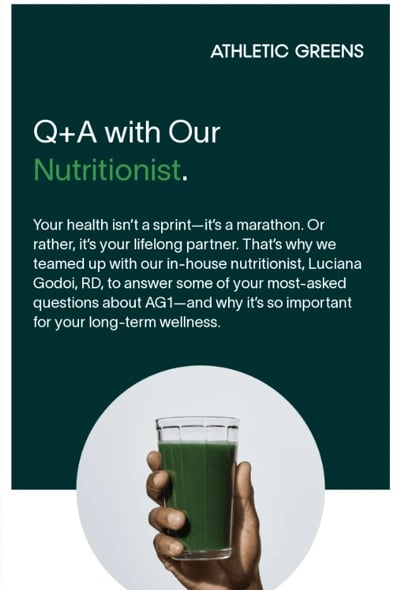
Marketing Campaign: Newsletter
I’m a huge advocate of thought leadership. To me, some of the best companies gain customer loyalty by becoming the go-to source for expertise on a given topic.
Athletic Greens — a company that sells green juice in a powder form — is that expert in the health and nutrition biz. How do I know? Just read their emails.
“Take it from the expert…”
That’s what the subject line of this email campaign reads before citing interesting answers about the benefits of the product.
It answers any questions a potential customer may have about why Athletic Greens works — and whether it’s worth adding to one’s routine. At the end, it includes a direct quote from Athletic Green’s nutritionist.
Why It Works
This email uses a professional’s expertise to sell the product, all while answering critical questions potential buyers may have before making a purchase.
27. Her First $100K

Marketing Campaign: Promotion
This email marketing campaign crushes it, and for so many reasons.
While it is quite long, the list format works wonderfully in this email from financial education brand Her First $100K.
First you’re drawn in with the testimonial at the top, then you’re presented with a list of reasons why you should join their Business Bootcamp — emphasizing the course is now 50% off.
Further down in the email, the details of the course are laid out, giving potential students a breakdown of what they can expect to learn. The language is friendly, succinct, and persuasive.
Why It Works
The email uses a friendly tone and a sense of urgency to entice customers to purchase the course. It harnesses the power of social proof to give an added layer of credibility.
28. Brooks Sports

Marketing Campaign: Engagement
When Desiree Linden won the Boston Marathon, she became the first American woman to win the race in more than 30 years.
To her shoe and apparel sponsor, Brooks Sports, it was an opportunity to celebrate their long partnership together. The resulting email campaign focuses almost entirely on the Olympic marathoner’s amazing accomplishment.
Email campaigns like this one allow companies to demonstrate their loyalties and add value to the products their best users have chosen. Not pictured is a blue CTA button at the bottom of the email that reads, “See Desiree’s go-to gear.”
What better products to call attention to than the stuff worn by one of America’s legends?
Why It Works
After Desiree’s victory, everyone knew her name. Brooks Sports struck while the iron was hot with a proud email that was sure to be opened and forwarded.
29. Etsy
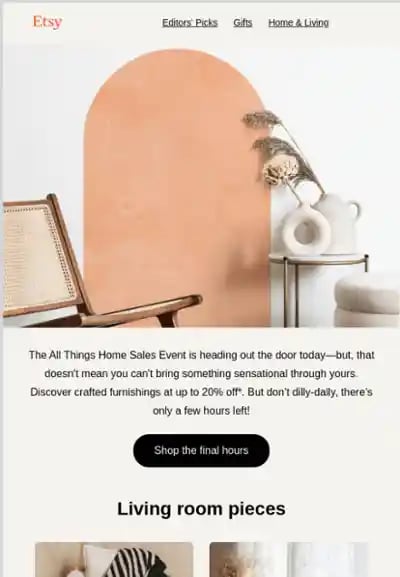
Marketing Campaign: Promotion
We love this email from Etsy. Not only is the design super eye-catching — without looking cluttered — but the home items are user-made. Etsy sells merchandise featuring designs from artists all over the world.
This presents a golden opportunity to feature popular products across the Etsy community.
This example showcases creations by several Etsy shops. When those makers see Etsy featuring their content, they’ll be more likely to forward the email to friends and colleagues.
In addition to linking to different Etsy shops’ products, the email campaign includes a time-bound call-to-action (“Shop the final hours”) and multiple eye-catching discounts.
For that reason, Etsy’s customers are likely to splurge — and open other emails in this campaign to find more ways to “Save on top faves.”
Why It Works
The email lets the items speak for themselves, showcasing them as art rather than products. We also love the cohesive aesthetic of the showcased Etsy shops.
30. Spotify
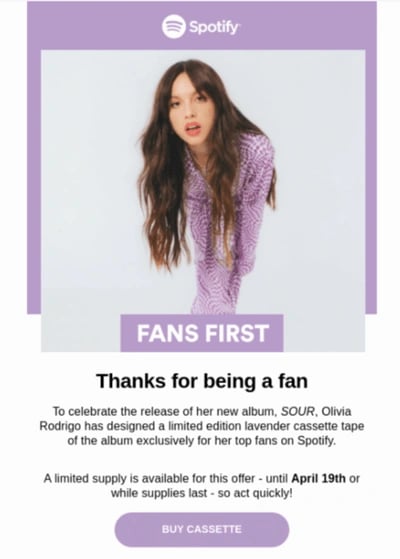
Spotify is the king of personalization (Spotify Wrapped, anyone?), and this email is no exception. The subject line — “Olivia Rodrigo made you something special” — already entices clicks, because only fans of the artist received this email.
The offer, which is to buy a cassette of the album, harkens to the nostalgic feelings highlighted by Olivia Rodrigo in her songs and by recent trends on TikTok and Instagram.
Why It Works
From the imagery to the call-to-action, this email is well-poised to generate purchases. We also love the color palette, which diverges from the Spotify branding only to highlight the colors from the album.
That way, it feels like you’re receiving an email from Olivio Rodrigo’s team, not a third party.
These are just some of our favorite emails. Don’t just follow best practices when it comes to your marketing emails. Every email you send from your work email address also can be optimized to convert with a little planning.
Want a quick refresher on how to master marketing email? Check out this helpful video:
Now that we’ve reviewed great examples, let’s get into how to create an effective email marketing campaign of your own.
How to Execute an Email Marketing Campaign
- Use an email planning template.
- Identify your goal for the campaign.
- Understand who you’re emailing.
- Put yourself in the shoes of the buyer persona.
- Build a targeted list and define enrollment criteria.
- Determine the timeline you want the campaign to run.
- Plan your emails and follow-ups.
- Write click-worthy subject lines.
- Write copy that’s suited for them.
- Create your brand assets.
- Put it all together with a comprehensive email builder.
- Include clear calls to action.
- Include personalization elements.
- Always provide a way for them to opt out.
- Test your emails and make sure they work on all devices.
- Monitor your metrics.
1. Use an email planning template.
Download This Planning Template
It’s imperative to make a plan before you start emailing your entire customer database.
That’s why HubSpot created this free email planning template to help you iron out who you’re emailing, who you’re suppressing from your contact list, and what the email’s message is.
Download the template now to get your email campaign planning organized.
2. Identify your goal for the campaign.
Figure out the outcome that you want:
- Is it to clean up your list?
- Promote a new product?
- Follow-up from an abandoned cart event?
- Stay top of mind with your audience?
Different email campaigns will have different outcomes, requiring different tactics to get there. Once you determine the purpose of your campaign, you can then create the targets you want to hit.
Include specific metrics in your goal so that you can determine if your campaign was a success based on quantitative data.
3. Understand who you’re emailing.
Have you ever heard the saying from Meredith Hill, “When you speak to everyone, you speak to no one”?
What Hill is getting at here is that if you’re watering down your message to apply to your entire audience, you’re leaving opportunity on the table — opportunity for creating high-value, specific, relevant content that speaks directly to the recipient.
With this in mind, the key to a great email marketing campaign is identifying your audience and using email segmentation to ensure you’re delivering to the right people at the right time.
If you can accomplish this and build it into your strategy, you can get more creative and specific with your messaging.
4. Put yourself in the shoes of the buyer persona.
After you’ve identified the outcome and the goals you want to hit, you now need to strategize how to provide value to your buyer persona so that they convert, engage, or take the action you want them to take.
Some things to ask yourself might include:
- How did they subscribe in the first place?
- What matters to them?
- What can I provide that will engage and delight them?
5. Build a targeted list and define enrollment criteria.
You know who you’re targeting and what you want them to do. From there, you must build the segment. Thinking about your buyer persona, what properties do they all have in common? How does your CRM describe those properties?
Your software is smart, but it’s not smart enough to automatically know which recipients you’re sending to.
Will the recipients receive the emails at the same time, or is there certain criteria they have to meet before they are enrolled in the sequence or campaign?
6. Determine the timeline you want the campaign to run.
You may be running a seasonal campaign that only requires one or two emails, or you might be building a long-term top-of-mind nurturing campaign.
Tailor the length of your email sequence to the length of the buying cycle and stage the persona is at in the buyer’s journey. In other words, deliver the right message at the right time.
7. Plan your emails and follow-ups.
Once you know who you’re emailing and why, it’s time to strategize how to move them from A (where they are) to B (where you want them to be, the goal of the campaign).
Over the course of the campaign’s timeline, you may want multiple touchpoints. You may also even consider follow-ups based on the actions that each recipient takes. Plan these emails out, outlining the core message and take-away for each email.
Keep in mind that you can’t expect a single email to do everything. Your email campaign can be made up of multiple emails, so consider taking your email recipients on a journey with each email serving a single purpose.
This will increase the odds of each email being successful in its role toward reaching your goal.
For example, if you’re doing a lead nurturing campaign, you might have a few educational emails to take them from the awareness stage to the consideration stage before providing more conversion-focused content.
The longer the buying process and sales cycle, the more emails you’ll need.
8. Write click-worthy subject lines.
The subject line is the gatekeeper of the rest of your email. Your buyer persona will not be exposed to your content unless they first click the subject line. With that in mind, use this precious real estate for copy that compels them to read further.
You can do that by:
- Piquing their interest
- Promising value
- Opening a loop (that will be closed in the body of the email)
- Using your unique voice to start the conversation
- Using personalization
9. Write copy that’s suited for them.
Once you know the purpose of each email you’re sending and you have the subject lines, you can write the copy that will engage your list.
Consider where your audience is in their buying journey and provide the type of content that they’ll find useful.
For example, it doesn’t make sense to promote products if you’re emailing a segment of subscribers who are largely in the awareness stage of the buying journey.
10. Create your brand assets.
Few people want to read an email that simply gives them a wall of text. Visuals help your recipients quickly understand the point of the email.
In fact, intentional and well-placed imagery can increase click-through rates, so put thought into not just what you want to say but how you want to say it, using visuals to support your message.
11. Put it all together with a comprehensive email builder.
Once you’ve written the copy for your emails, you’ll want to build them out in the email software client you’re intending to use.
There are several options depending on your needs, including HubSpot, MailChimp, Pabbly Email Marketing, and Constant Contact.
With a comprehensive email builder, you can create, optimize, and personalize your own email campaigns without needing any technical or graphic design experience.
12. Include clear calls to action.
Remember, if you’re taking up your audience’s time — and inbox space — with another email, your message must have a point to it. Consider what you want your email recipients to take away from the email.
In most cases, you’ll want to add a call-to-action (CTA) for them to take further action.
Don’t confuse your email contacts by providing too many options. For each email you send, there should be a single action that you want the reader to take. Then, instruct them to take that action and set expectations for what will happen when they do.
Your goal behind the CTA may vary depending on the audience’s buyer’s journey stage and what you want to accomplish with your email campaign.
For example, you may simply want to engage them further with another piece of content, or you might want to get them to make a purchase.
Regardless of what it is, you should follow CTA best practices such as making the ask with clear language and emphasizing it with contrasting design elements.
13. Include personalization elements.
Consider the experience. Do your email recipients want to feel like one among hundreds of other people in your database? Or do they want a personalized experience as though you’re talking directly with them?
Automation helps save time, but it should never be at the cost of the experience. Marketing emails need to be personalized to the reader and contain information that is relevant to them.
At the very least, swap out the “Dear Sir/Madam” in favor of their name using personalization tokens.
14. Always provide a way for them to opt out.
People who don’t want to read your emails don’t belong on your list. Keeping them only skews your open rates down and increases the number of people marketing your emails as spam.
Besides, according to CAN-SPAM guidelines, you should always provide a way for them to opt out of email if they no longer want to receive communications from you. Typically, this opt-out link lives in the footer of each email you send.
15. Test your emails and make sure they work on all devices.
Once your emails are built out, check them over before hitting the send button. Effective email marketing campaigns are designed for all devices on which users can read their emails — desktop, tablet, and mobile.
Consider sending them as a test to a colleague and checking them across multiple devices and email clients.
16. Monitor your metrics.
As the campaign runs, take notes. Are your open rates and click rates what you expected? What went well vs. not well? Are you on track to hitting your goals with the campaign?
The more you pay attention to the data, the more you can understand what’s working and what’s not for your audience, leading to more effective campaigns in the future.
Your Turn to Create Effective Email Marketing Campaigns
Email marketing is a fantastic way to nurture leads, engage subscribers, and retain customers. The examples we shared above will help you brainstorm winning campaigns that drive sales and offer a high ROI.
But to make the most out of your efforts, you should use a planning template to organize all of your campaigns in one place.
Editor’s note: This post was originally published in October 2013 and has been updated for comprehensiveness.
